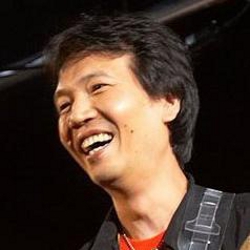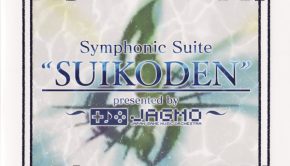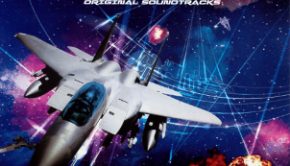Motoaki Furukawa Profile
 |
Also Known As: 古川 もとあき (もとあき もとあき) / 古川元亮 / M. Furukawa / Michelle Furukawa |
| Date of Birth: September 7, 1963 (Kobe) |
|
| Residence: Hyogo |
|
| Game Works: Gradius, Super Contra, Policenauts, Kukeiha Club |
|
| Official Site: Japanese Site |
History
| Organisation | Type | Tenure | Role |
| Voyager | Music Group | 1988 – 1989, 2006 – | Founder, President, Artist |
| Konami | Game Developer | 1986 – 2003 | Composer, Arranger |
| Kukeiha Club | Music Group | 1990 – 1998 | Founder, Composer, Arranger, Guitars |
| Winbee Neo Cinema Club Band | Music Group | 1993 – 1995 | Guitars |
| M’s Art | Record Label | 2007 – | Founder, President, Artist |
| GE-ON-DAN | Artist Collective | 2009 – 2011 | Member |
Biography
Motoaki Furukawa is a guitar-obsessed composer and remixer best known for working for Konami on various shooters, the GuitarFreaks series, and their in-house band. Born in Kobe on September 7, 1962, Furukawa initially became interested in music when he listened to The Carpenters during his first years at school. In his middle school years, he joined a brass band club and began to play the clarinet. The club leader introduced him to The Beatles in an experience that greatly influenced his musical career thereafter. He was initially shocked to learn that “Help!” and “Ticket to Ride”, two of his favourite Carpenters songs, were actually originally created by The Beatles. As he listened to more from the band, he felt especially moved by their penetrating sound. Together with his friends from brass club, Furukawa assembled a band to cover The Beatles. After his friend lent him an electic guitar, he practiced with a chord book and copied Beatles songs by listening to them by ear over and over again. As he entered commerce school, his father bought him a semi-acoustic Epiphone Riviera guitar that John Lennon and George Harrison used. With his school friends, he assembled a full-scale band called SGT. They ended up being well-received at gigs and began to diversity by incorporating traditional Japanese music, an area Furukawa had become interested in.
As Furukawa entered Kobe Commerce University, having performed music for four years, his musical interest became even greater as the fusion boom emerged. Hestarted to listen to the music of Masayoshi Takanaka, Casiopea, Larry Carlton, and Lee Ritenour, his long-term protegé and current favourite guitarist. After buying a Yamaha SG-3000 electric guitar and forming the band Shiranzo, he played a mixture of Takanaka covers and original works. His subsequent band, Mint Blue, was more successful. They played Casiopea covers and original songs, often performing frequently at a Kansai venue. The band entered numerous contests and Furukawa won many awards dedicated to excellent guitar performance. He then further committed himself to Lee Ritenour and Larry Carlton. Furthermore, the artist mastered jazz theory through self-study, paying particular attention to the works of guitarists Joe Pass, Wes Montgomery, and Pat Martino and saxophonists Charlie Parker and Sadao Watanabe. He stopped playing covers thereafter and formed Voyager, a band dedicated to creating original music. Influenced by Ritenour, he performed with a handmade Schecter and the semi-acoustic Gibson ES-335. Voyager had successful gigs across Japan, in no small part due to Furukawa’s creative compositions and energetic performances. Even though their activity subsided as its members went on to other projects, the band remained committed to an eventual reunion.
While wishing to create more solo and band works, Furukawa required reliable employment after graduating university. The artist applied to work in Konami and joined their sound design room in October 1986. Already reputed within his company due to his band background, he was soon asked to produce defining pieces for several major releases; marking his debut with the ending theme for their adaptation of King Kong 2, he also impressed colleagues with his catchy jazz fusion theme for F1 Spirit and wrote a medley dedicated to Haunted Castle for the album Konamic Game Freaks. His first major work was as the leader of the score for Nemesis 2 (aka Gradius 2), released for MSX-2 in 1987. One of the first scores rendered with SCC’s custom sound chip, the score pushed boundaries with its rich, expressive compositions, demanding both musical and technological prowess from Furukawa. Continuing his work with shooters, Furukawa co-produced the score for Salamander’s MSX-2 port with Masahiro Ikariko — offering both remixes of the arcade score and fresh new compositions — between featuring on the upbeat, rock-influenced score for Hi no Tori. He was also one of the three sound creators that worked on the original version of Metal Gear under the direction of Hideo Kojima, which demanded a more serious, cinematic approach.
Released in 1988, the arcade shooter sequel Gradius II: Gofer no Yabou has emerged as Furukawa’s most iconic score. Throughout the project, Furukawa aimed to combine the melody-driven approach of the original with a cool rock sound ideal for a teenage Japanese audience. In fact, he approached many of the score’s most iconic tracks, for example “Burning Heat”, “A Shooting Star”, and “Farewell”, in the same way he produced songs for the band Voyager. Reflecting the enthusiastic reception to the music, the soundtrack received a dedicated album release — unusual for the day — complete with a six track rock arranged version. The artist also grabbed the attention of mainstream listeners with the scores for Super Contra and A-Jax, also packaged together on an album. Each game had clear influences from movies popular at the time — the former inspired by First Blood, the latter more like Top Gun — and hence their soundtracks were also full of punchy rock anthems. Furukawa lent his services to a number of other arcade titles, including the boxing game The Final Round, the cop title Gang Busters, and the puzzler Block Hole during this period. He additionally returned to the MSX-based Nemesis 3: The Eve of Destruction (aka Gofer no Yabou Episode II).
At the end of 1989, Furukawa was transferred to Konami’s CD production sector, where he was involved in arrangement, composition, and recording for various albums as Konami released an influx of new albums under King Records. During his initial few months there, Motoaki Furukawa wrote the self-titled debut album of Konami’s in-house band, the Kukeiha Club. Led by Furukawa and produced by Shigeru Fukutake, this jazz fusion band were intended to be Konami’s answer to the S.S.T. Band. Their self-titled debut album included five original fusion tracks and five Konami arrangements, though its musicians were chiefly external to Konami. In 1991, the band made their live debut at the Game Music Festival in 1991, with a final line-up comprising Konami musicians Motoaki Furukawa on lead guitar, Mami Asano and Kenichi Mitsuda on keyboards, and Tappi Iwase on drums and percussion. Furukawa found the experience of performing live particularly fun and felt like he was a band leader from a bygone era. Despite this, he still appeared on several game releases. He wrote the entire score for the original arcade version Sunset Riders, mixing spaghetti western influences with a contemporary touch, between penning another catchy shooter score for Xexex. Motoaki Furukawa was also part of the large ensemble team that wrote the music for SD Snatcher.
While Motoaki Furukawa was already known internally as one of Konami’s musical heavyweights, it was the Kukeiha Club that first exposed his name to the masses. In response to popular demand, Furukawa decided to produce a solo album of his own with support from Konami’s label, 1992’s Sound Locomotive. The album mostly featured smooth guitar-led jazz-rock fusion music performed by several studio musicians, including Furukawa himself on guitar. The artist also took the album to the stage with special concerts at Tokyo and Kobe. This was the first time a dedicated game musician released a solo album in Japan. The following year, he and the Kukeiha Club composed and performed their second album, Hope — a more serious and jazz-oriented release than their previous works. The band also continued to make appearances at the annual Game Music Festivals right up to 1995, usually performing covers of Konami favourites; their tracks were not featured in the album compilations for the series, but a few of their performances appeared in Konami compilation albums. Furukawa also penned special arrangements for a number of album releases, notably Gradius III, Thunder Cross, Madara, and Detana!! Twinbee, most of which featured the popular jazz fusion style of the time. Also gaining experience as a vocal composer, he contributed special vocal themes to Konami All-Stars 1993 and Gokujou Parodius, between performing guitar on the three Winbee’s Neo Cinema arranged albums.
Maintaining a close relationship with Hideo Kojima, Furukawa was asked to lead the arrangement of the Turbo CD version of Snatcher in 1992. Many of the tracks from the original score were enhanced with CD-quality audio, adding to the strong atmosphere of the graphic adventure. The artist also helped to pen the diverse score for PC-9821’s Policenauts, released by Kojima two years later; loaded with vintage synth pads and funk bass lines, the soundtrack once again evoked memories of 1980s film scores. To commemorate its PlayStation remake, the composer formed the F/N sound unit with Koichi Namiki and produced an arranged album from the source material. In other productions, Furukawa penned two new tracks for the Gradius Deluxe Pack, composed some music for Goemon: Space Pirate Akoging, and took arrangement credits on Vandal Hearts and Tokimeki Memorial: Forever With You. Furukawa also coordinated the music for the parodic shooter Jikkyou Oshaberi Parodius: Forever With Me, dominated by light-hearted arrangements of classical and video game tunes. His services as a guitarist were requested on Dracula X: Rondo of Blood and Suikoden; while the former featured rip-roaring rock performances, Furukawa showed more sensitivity with his solo acoustic renditions of the main theme and “Theme of Sadness” for the latter.
Also continuing to compose and arrange vocal themes, Furukawa contributed to the numerous albums released for the Tokimeki Memorial dating simulators during the mid-90s; sung by idols such as Mami Kingetsu, Aya Hisakawa, and Sachiko Sugawara, these songs were filled with upbeat lyrics and 80s pop stylings. He was also closely involved with the Twinbee Paradise albums, composing both background music for their drama albums and special theme songs sung by Mariko Kouda. Though the Tokimeki Memorial and Twinbee Paradise albums never acquired considerably popularity in the West, they entertained a large audience in Japan and enjoyed considerable commercial success. During this period, the Kukeiha Club shifted away from writing original music and evolved into a cover band. Furukawa led them on the three instalments of the Pro-Fusion arranged album series; adapting material from Tokimeki Memorial, Salamander, and Twinbee Yahho!, these albums mostly featured a jazz-rock fusion style, yet emphasised the unique character and melodies of the source material. The band closed their time together by releasing two special compilation albums comemorating their career in 1997 and 1998. Concluding a ten year relationship, the artist also contributed the original rock tracks “Heavy Metal Gear” and “Exit” for the Metal Gear >> Solid Snake Hideo Kojima Music Collection.
Coinciding with the disbandment of the Kukeiha Club, Furukawa was transferred to Konami’s Consumer Software Division of Sound Design in March 1998. He served as a guest composer and remixer on Castlevania 64 (aka Akumajo Dracula: Apocalypse). Under the lead of Masahiko Kimura, the score rejected the melodic rock feel of preceding scores in favour of chilling ambience and dabs of synthetic orchestration. Furukawa went on to pen the soundtrack for the sixth instalment of the baseball series Jikkyou Powerful Pro Yakyuu alongside Kazuhiko Uehara and Nobuyuki Akena. Furukawa was transferred again in May 1999 to the AM Business Head Office. Here, he principally worked on GuitarFreaks series as part of an ensemble team. This line of Bemani music games, established in 1998, gives players the opportunity to perform the guitar sections of specific pieces of music that span a range of difficulties. Since his debut with “Body Operation” on 1999’s 2nd Mix, Furukawa returned for the subsequent instalments of the biannually released series alongside fellow recurring artists such as Mutsuhiko Izumi, Harumi Ueko, and Naoki Maeda. He tended to compose a few pieces per game and do some MIDI programming, finding the series ideal vector to express his love for composing for the guitar. He was also asked to pen music for little-known titles such as Boxing Mania: Ashita no Joe, an unreleased Hawaii-developed golf title, and Mambo A Go Go, a stand-alone bongo-beating music game with Latin compositions.
After penning special arrangements for the Gradius Arcade Soundtrack and Salamander Arcade Soundtrack, Furukawa decided to leave Konami in January 2003 to become a freelancer. Since his departure, he has maintained a steady output of compositions and arrangements each year, mostly in his trademark style. Shortly after his departure, he released the pop-rock mini-album Sunshine Blue, his first solo release in over a decade. The artist went on to produce his second full-length solo album, Under the Blue Sky; something of a career reflection, the album blended nostalgic jazz fusion tunes with arrangements of Gradius favourites. Due to a close association with the Scitron Label, Furukawa was also asked to participate in numerous arranged albums. Some of these releases covered familiar material, such as the Game Sound Legend Series Speed & Wind, Konami Famicom Super Medley, and Gradius Tribute. In other productions, he has commemorated the music of Street Fighter II, Yoshi’s Cookie, Gunstar Heroes, and Phantasy Star Online. But despite the overall popularity of the source material and his style, he has risked exhausting his style with a plethora of similarly styled arrangements, writing nine guitar-focused Gradius arrangements in the space of several years. The legacy left by his Konami years has resulted in him becoming a minor celebrity in Japan, meaning he was well-received in guest appearances at concerts such as The Black Mages Live “Above the Sky”.
While Furukawa retired from writing conventional game scores after leaving Konami, he continued to contribute to the GuitarFreaks series between 2003 and 2007. He penned pieces such as “Smile For You”, “Dance for Your Future”, “Street Runner”, “Hello You”, “Ano Hi no Kaze”, and “Just in My Heart” for the various instalments of the franchise. Many of them have gone on to become classics among series’ followers and have been well-received in the series’ album releases. He terminated his involvement in the series after penning the vocal track “True Love and Valentines” and the Gradius tribute “Tabidachi” for GuitarFreaks V4, before making a brief return with “Sky Runner” for GuitarFreaks XG. In 2006, the artist also reunited with the band Voyager. The band have since appeared at a number of concerts, combining renditions of old favourites with new compositions such as the Maxi single “Ultra&9734;7”. The band memorably appeared at 2007’s Extra: Hyper Game Music Event 2007, offering both Konami remixes and original tunes to an enthusiastic audience. At the end of 2008, they performed two special concerts at Tokyo and Kobe alongside guest guitarist Koichi Namiki. This performance has been released on a special DVD.
Following his departure from the GuitarFreaks franchise, Furukawa set up the M’s Art record label in October 2007. In the three years thereafter, Furukawa released new EPs on a monthly basis, most featuring five or six newly composed tracks with a jazz-fusion emphasis. The albums span concept albums inspired by daily life (e.g. Departure, Love Romancer, Hot Vacation!), to guitar-focused releases (e.g. Healing Guitar, Playing Guitars, A Journey on the Guitar), to compilation editions (e.g. M’s Art Assorted, Motoaki Furukawa Best of the Best). This huge library of music is not generally intended for personal listening, given each release is priced in the 4000 JPY range. Instead, corporations can purchase these albums and use the pieces royalty-free on various releases. For example, the background music of Thunder Force VI featured tracks taken from the album Traditional Shooting along with original music contributed by other composers. While the pace of his release has slowed somewhat, Furukawa continues to release several such albums each year, mostly recently Playing Guitars 3 and Go for a Drivin’ 2. Breaking up such work, the artist also offers one-on-one lessons for aspiring acoustic and electric guitarists of a range of ages and experiences at his studio in Kobe.
Though Furukawa now focuses almost entirely on library music, he has recently made some appearances on other game-related productions. Mediated through his membership of the sound creator’s alliance GE-ON-DAN, the artist contributed to DoDonPachi Dai-Ou-Jou’s arranged album and DeathSmiles IIX’s downloadable stage themes. Also maintaining a relationship with Konami, he remixed four of his shooter tracks for Otomedius G, composed an entire set of alternative stage themes for Otomedius-X, and penned “Sweet Angel” for the music game jubeat ripples. The artist also continues to occasionally write vocal music, having penned the single “It’s so Rhythm”, as part of the unit Wonder Pochi, and contributed to the collaborative vocal album Message. Furukawa continues to make live appearances with Voyager, having recently released CD and DVD releases of their 2010 and 2012 performances in Kobe. Furukawa’s Konami legacy is often distorted by the widespread misconception that he once led the sound team. Nevertheless, the impact he left is still enormous and, unlike most of his contemporaries, he received plenty of popular exposure thanks to his prominent solo and arrangement work there. Despite largely retiring from video game soundtracks, he remains a popular, productive, and commercially successful musician.
References:
– Various Game & Album Credits
– VGMdb Discography
– Personal Website (Japanese)
– Company Website (Japanese)
– Interview with GA-Core (Japanese, February 2009)
© Biography by Chris Greening (September 2007). Many thanks to Addison for translation assistance. Last updated on February 4, 2013. Do not republish without formal permission.
Posted on February 4, 2013 by Chris Greening. Last modified on March 21, 2014.














